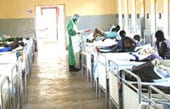15 Years of Ebola Research Prepared Them Well
Anthony Sanchez, High-Containment Laboratory Manager for the Division of High-Consequence Pathogens and Pathology (DHCPP), has a long history of studying the molecular biology of filoviruses, like Ebola.Through the mid-1980s to mid-1990s, Sanchez and Heinz Feldman worked to characterize the Ebola virus genome, yielding years of rigorous research and progress on the diagnosis, pathology, and potential medical counter measures, and vaccines for the Ebola virus disease.
“Those experiences forever changed my feelings toward Ebola virus, but also instilled great admiration for those who risked and gave their lives to stop that outbreak. Similar experiences undoubtedly have and are being played out in West Africa, and my admiration extends to those responders as well.”
– Anthony Sanchez
In 2000, Uganda was hit with what was the largest Ebola virus outbreak ever at that time. Sanchez and fellow DHCPP filovirus experts, Pierre Rollin and Jonathan Towner, got their first chance to translate their scientific expertise into life-saving public health action. They established and operated the first molecular field laboratory in the highly-affected Gulu district. They played a critical role in diagnosing cases and determining recovery. From August 2000 through January 2001, they identified 425 cases of Ebola.
When the outbreak ended in January 2001, the lab teams returned to headquarters armed with frozen specimens adding new momentum to their laboratory research informing future improvements on diagnostics, prevention and control of Ebola.
Since that time, DHCPP lab staff helped stop several outbreaks of Ebola and Marburg viruses in Africa through quick deployment of field laboratories. That experience has prepared them for responding to the current outbreak in West Africa.
